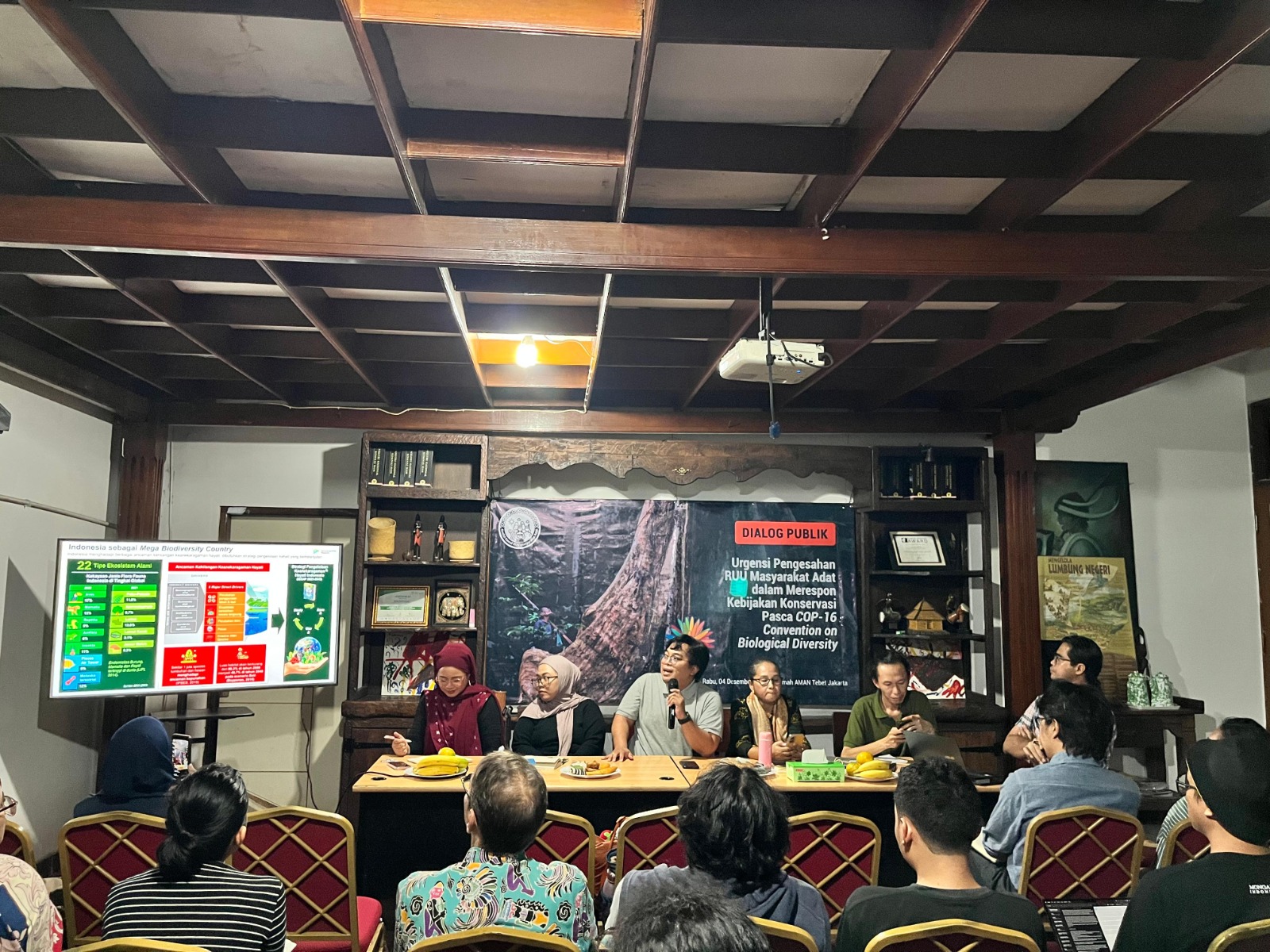Jakarta, December 5, 2024 – Following the World Conference on Biodiversity (COP16) held on November 1, 2024 in Cali, Colombia, the urgency of passing the Indigenous Peoples Bill in Indonesia is becoming more pressing. Recognition and protection of the rights of Indigenous Peoples are key to ensuring their involvement in the implementation of the Kunming-Montreal Global Biodiversity Framework (KM-GBF). Without the Indigenous Peoples Bill, the contribution of Indigenous Peoples to sustainable and inclusive conservation will continue to be hindered.

This was conveyed by Cindy Julianty, Program Manager of the Working Group Indigenous Peoples’ and Community Conserved Areas and Territories Indonesia (WGII), in a public discussion entitled “The Urgency of Passing the Indigenous Peoples Bill in Responding to Conservation Policies Post COP16” held at the Indigenous Peoples Alliance House (AMAN), Jakarta, on Wednesday (4/12). In addition to Cindy Julianty, Bimantara Adjie (HuMa Association), Teo Reffelsen (WALHI National Executive), Rukmini Paata Toheke (Sulawesi Regional Dynamator JPH AKKM), Mufti Fathul Barri (FWI), Tommy Indyan (AMAN) participated as speakers, and Salma Zakiyah (Sustainable MADANI) as the moderator.
Cindy Julianty also emphasized the importance of the involvement of Indigenous Peoples in achieving global biodiversity protection targets. “Conservation cannot merely focus on environmental preservation. Conservation also means recognizing tenure rights in Indigenous Peoples’ territories,” said Cindy. She mentioned that the Indigenous territories database records 22.5 million hectares of Indigenous territories with the potential for conservation. “These grassroots conservation practices can drive Indonesia’s contribution to achieving global biodiversity targets,” she added.
Bimantara Adjie Wardhana, Legal Advocacy Division of the HuMa Association, added that although Indigenous Peoples play a strategic role in the Indonesian Biodiversity Strategy and Action Plan (IBSAP), specifically in Targets 16 and 17, policy implementation often fails to actively and inclusively involve them. “Active and meaningful participation of Indigenous Peoples is often overlooked in the implementation of biodiversity policies in Indonesia, such as in the formulation of the IBSAP. Yet, the IBSAP is the key to mainstreaming biodiversity in Indonesia,” he said.
Meanwhile, Teo Reffelsen, Legal and Advocacy Manager of WALHI National Executive, criticized the process of forming the Law on the Conservation of Biological Resources and Ecosystems (UU KSDAHE) which is considered to neglect meaningful participation. “Many field facts presented by the coalition are ignored without clear reasons by the House of Representatives,” said Teo. He also reminded that since 2012, the Constitutional Court has mandated the government to establish regulations related to Indigenous Peoples, but this has not been realized until now. “Unfortunately, in AMAN’s lawsuit, the State Administrative Court failed to assess the judicial order principles existing in several Constitutional Court decisions related to the urgency of the Indigenous Peoples Bill, so in terms of legislation and policy, Indigenous peoples are put on the back burner. It is not surprising to see the situation of Indigenous Peoples in and near forest areas deteriorating and becoming alarming,” he concluded.
Rukmini Paata Toheke, Regional Dynamator of the Sulawesi Network of Stakeholders of Community-Managed Conservation Areas (JPH AKKM), explained that the Indigenous Peoples of Ngata Toro have long been practicing conservation based on local wisdom. These efforts include documenting customary laws, managing manageable areas, and traditional schools. “We have a philosophy of the three furnaces of life, Taluhi Takuhua, where the community maintains good relationships with the earth’s creator who has provided its contents, with fellow humans, and nature. When we harm nature, we harm life. This is the basis for us to preserve ancestral wisdom. This is our pride as Indigenous Peoples. However, the state does not appreciate our efforts,” she emphasized.
In line with this, Mufti Fathul Barri, Executive Director of Forest Watch Indonesia (FWI), mentioned that 80% of the world’s biodiversity is located in Indigenous Peoples’ territories. However, the UU KSDAHE in Indonesia diminishes their role. “Our conservation paradigm has not shifted, even though Indigenous Peoples have been proven to be key actors in biodiversity conservation,” he revealed.
Tommy Indyan from the Directorate of Legal and Human Rights Policy Advocacy of the Indigenous Peoples’ Alliance of the Archipelago (AMAN), emphasized that the passage of the Indigenous Peoples Bill is a crucial step in protecting the rights of Indigenous Peoples. He stressed the need for clear definitions, simple registration mechanisms, and recognition of the rights of Indigenous women, youth, and children in the Indigenous Peoples Bill. “An ideal bill should be based on human rights principles and include mechanisms for




0 Komentar
Tinggalkan Balasan